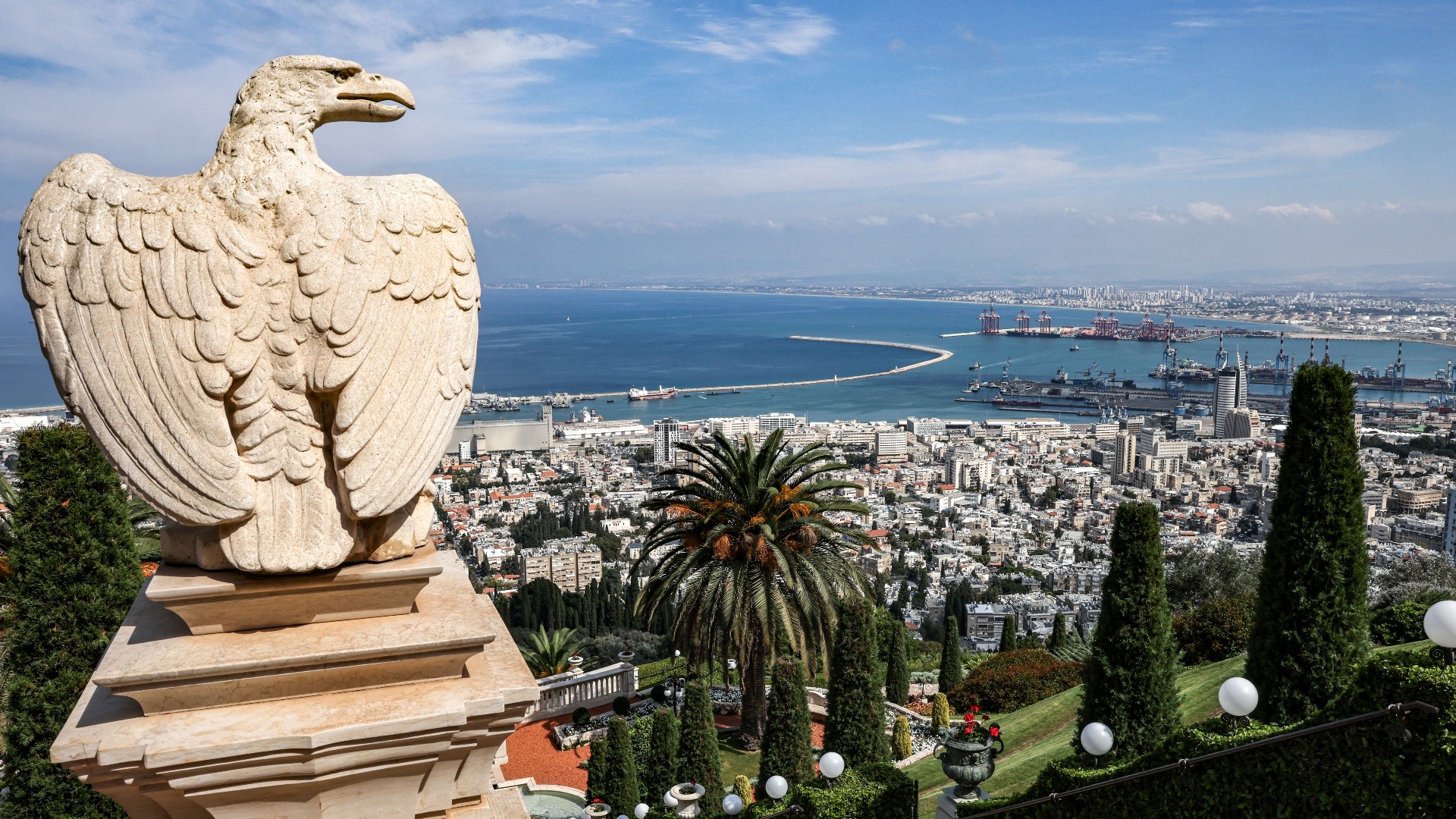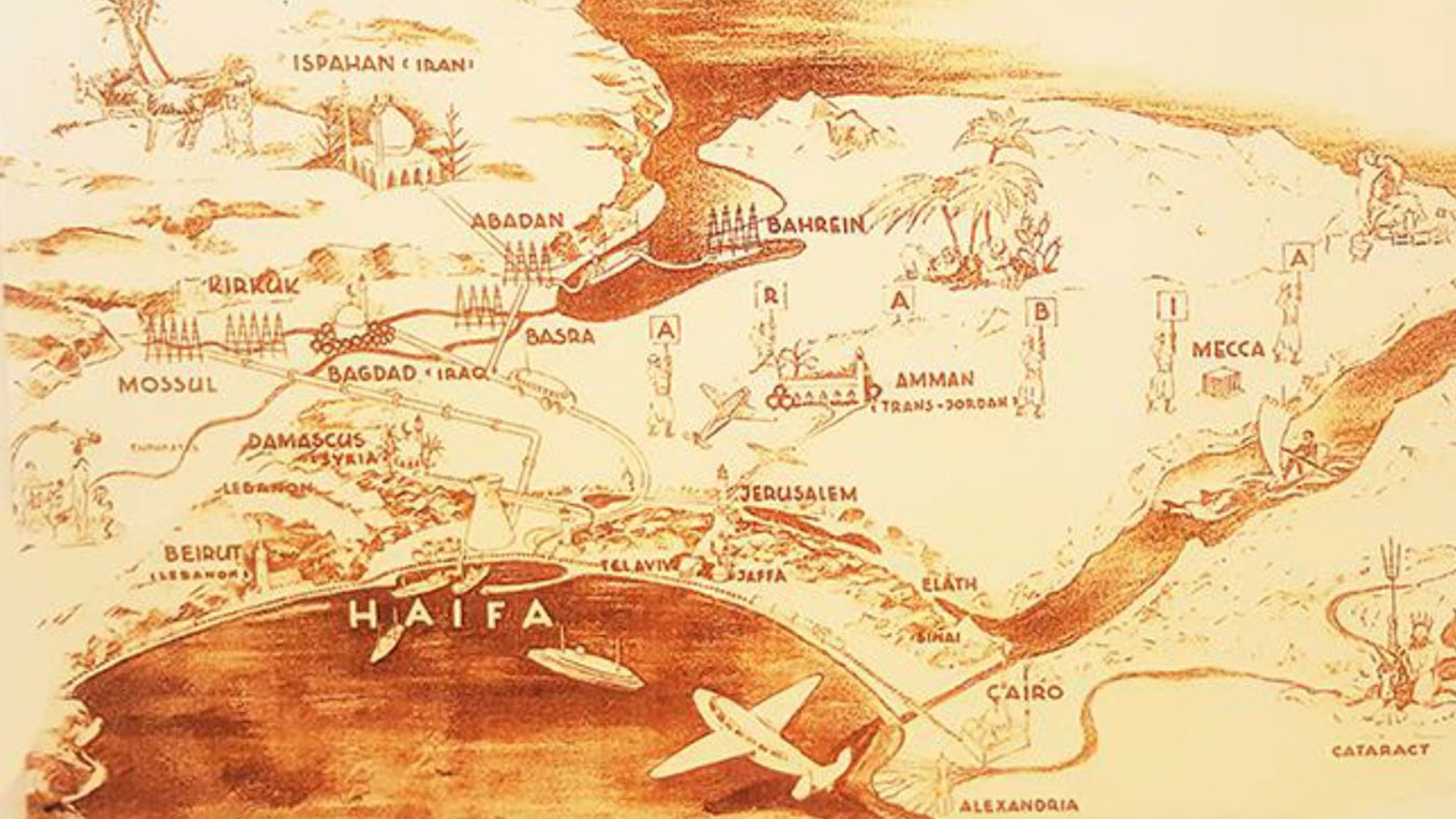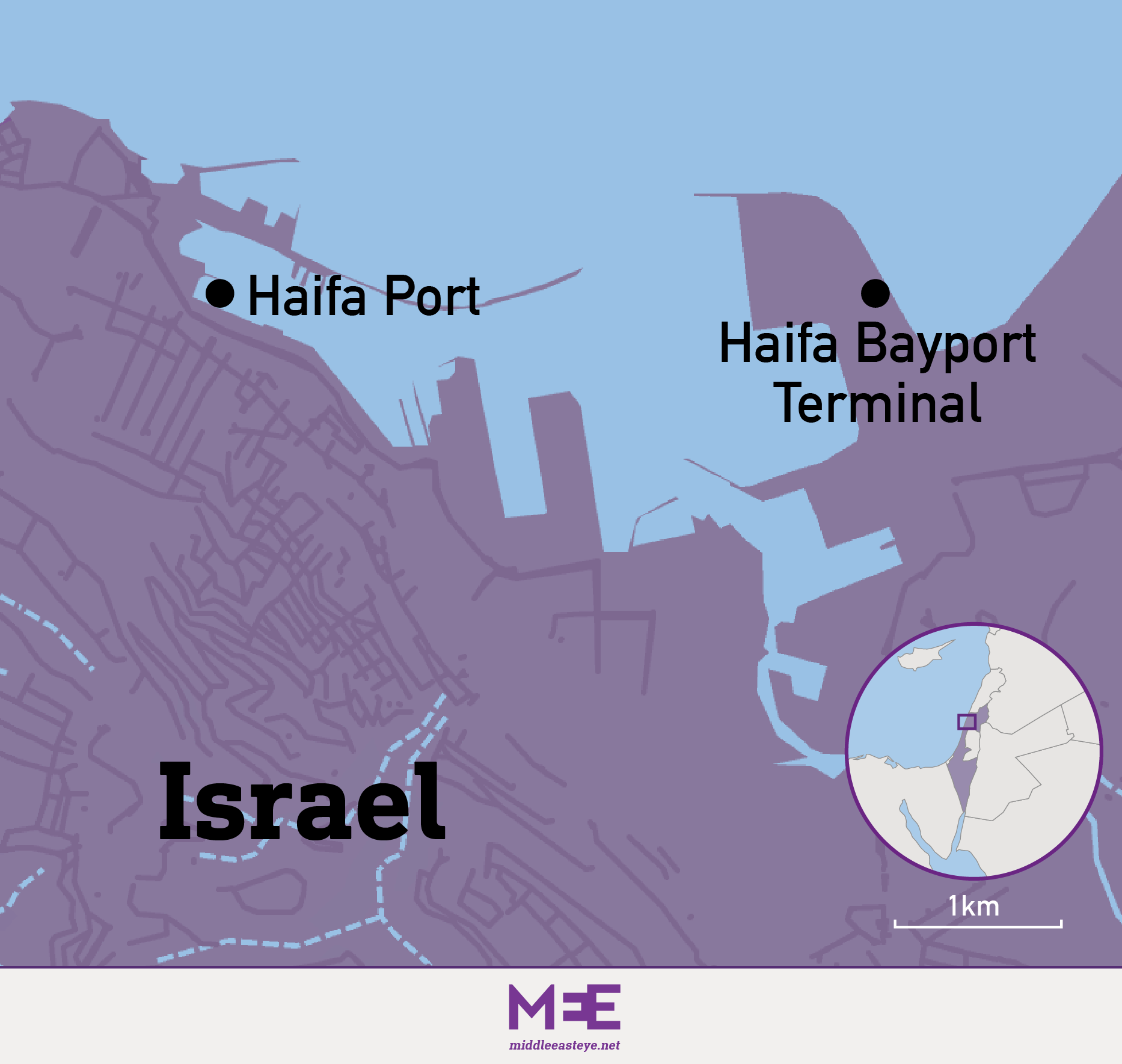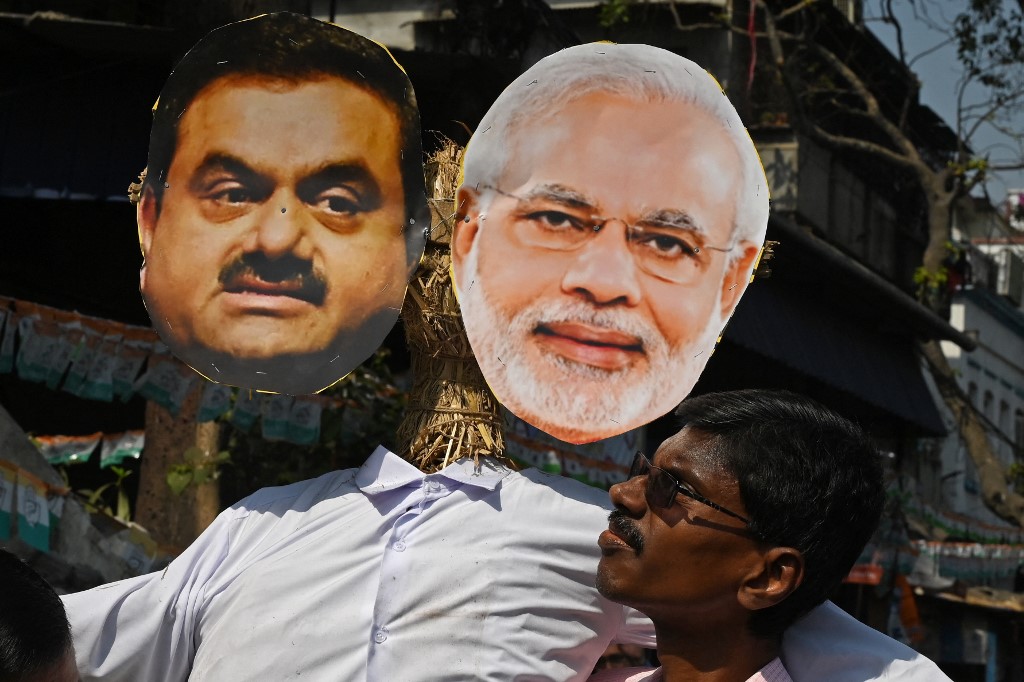
Haifa Port, Gautam Adani and Israel's plan for the Middle East
"Liberating."
That's how Israeli Prime Minister Benjamin Netanyahu described Indian tycoon Gautam Adani's acquisition of Haifa Port.
Appearing alongside the business magnate at the signing ceremony in late January, a smiling Netanyahu heaped praise over the $1.2bn deal and said he hoped it would usher in more "connectivity between our countries".
"I think this is an enormous milestone… Over 100 years ago, and during World World I, it was brave Indian soldiers who helped liberate the city of Haifa. And today, it's very robust Indian investors who are helping to liberate the port of Haifa," Netanyahu said.
The deal, one of the biggest foreign investments by India in any Israeli sector, saw Adani Ports and Special Economic Zone (APSEZ) acquire a 70 percent stake of the now privatised Haifa Port, while Israel's Gadot Group purchased the remaining 30 percent.
Stay informed with MEE's newsletters
Sign up to get the latest alerts, insights and analysis, starting with Turkey Unpacked
Dominating headlines in both Israel and India, the deal was supposed to be a landmark moment for the coal magnate who was the world's third-richest person at the start of the year.
'Haifa Port has been a key site of Zionist and Israeli nation-building'
- Sharri Plonski, Queen Mary University
But within days of crossing the t's and dotting the i's, Adani's flagship company, the Adani Group, was reeling under accusations of financial malpractice, fraudulent transactions, and share price manipulation.
The value of his companies fell dramatically despite a $400m investment from an Abu Dhabi investment fund. Within the span of a month, Adani, who has denied the charges, fell off the list of the world's top 10 richest people.
Given Adani's close proximity to power brokers in New Delhi, the Economist said it was "a political embarrassment" for Indian Prime Minister Narendra Modi and one that "confronts Indian capitalism with its sternest test in years".
Netanyahu would call Modi on 9 February and the two friends would speak for some 20 minutes. Though the specifics of the conversation haven't been disclosed, both countries reaffirmed their commitment to strengthening ties and building on their strategic partnership.
That statement appeared to allay fears over Adani's involvement in Haifa Port and his ties with several Israeli companies and initiatives.
Later, Noar Gilon, Israel's ambassador in New Delhi, would tell local media: "Adani is a very strong player in the world's port system. That is his core business. We believe that he will make this port stronger. He has paid all the money for the port.
"The port is his (Adani's). I believe the company has an interest in making this port successful, that is the hope of Israel and the interest of Israel, and that is in the interest of the Adani group as well. I believe that this port is going to be a flourishing port in the Mediterranean."
In other words, the deal was done, Haifa was sold and both sides were going to make it work.
The story of Haifa Port
Sitting on the shores of the Mediterranean, Haifa Port has served as a major hub for seafarers from North Africa and Asia for hundreds of years.
Under the Ottoman Empire, it served as a key port at the northern tip of Palestine and was a catalyst for the city's population growth.
In 1918, Jews constituted less than 3,000 of the city's 22,000 residents. Under the British Mandate of Palestine, work began in 1929 to turn it into a fully-fledged deep-water port.
Authors Regev Nathansohn and Abbas Shiblak have noted that during this period, the late 1920s and 1930s, Haifa thrived and served as the administrative and economic centre of northern Palestine, even though 40 percent of the Palestinian population lived in slums.
"The city became a magnet, attracting Arab entrepreneurs and labor force from neighboring countries and beyond, and it increasingly offered diversity with respect to the 'other', and openness and tolerance towards the newcomers," Nathansohn and Shiblak wrote in Haifa Before & After 1948: Narratives of a Mixed City.
At the same time, the city also witnessed a divisive drive towards the establishment of a "Jewish national home".
"Haifa Port has been a key site of Zionist and Israeli nation-building ever since," Sharri Plonski, a senior lecturer at Queen Mary University, told Middle East Eye.
"It was also home base to the clandestine missions of the 'Palyam'. These pre-state naval militias were known for their sabotage of British ships and 'daring rescues' of Jewish refugees from British detention camps in the 1940s," Plonski added.
By 1947, the Jewish presence had increased and constituted around half of the city's 140,000 population. Under the UN Partition Plan, Haifa was designated as part of the new state of Israel and witnessed intense violence when Palestinians began being expelled in 1948.
Zionist militias displaced tens of thousands of Palestinians from the city and surrounding areas in an event the Palestinians call the Nakba, or Catastrophe.
On 30 June 1948, the British flag was removed from the port.
'This deal shows that Israelis trust India enough to privatise the state-owned Haifa Port and give it to Indian hands'
- Hananya Naftali, Israeli influencer
"Haifa was historically a strategic port in the past. It was where the oil used to come in from Iraq. They (the British) lost that when the 1948 war happened," Toufic Haddad, a social scientist based in Jerusalem, told MEE.
"As far as a reliable port for western interests in the Eastern Mediterranean, Israel is the main bastion for that and Haifa is significant for that," he added.
Following the end of World War II, Haifa continued to be a key entry point for thousands of Jewish refugees and settlers from Europe.
In the 1950s, the port expanded under state control and would later become the largest and most important of Israel's three ports, the others being Ashdod and Eilat.
Haifa Port is so integral to Israel's GDP, that it's estimated to handle around 50 percent of all of Israel's cargo.
Along came Adani
Since the early 2000s, deliberations over privatising the port began under a series of economic reforms initiated by Netanyahu, who has repeatedly encouraged the sale of public assets to purportedly reduce corruption and lower costs.
In 2015, Shanghai International Port Group (SIPG), won a bid to operate the Haifa Bayport terminal for 25 years, much to the chagrin of the US government.
During his visit to Israel in May 2020, then-Secretary of State Mike Pompeo called on Israel to cease infrastructure projects with the Chinese.
"We want the Chinese people to be successful, but we don't want the Chinese Communist Party to have access to Israeli infrastructure and to Israeli communication systems - all of the things that put Israeli citizens at risk - and in turn put the capacity for America to work alongside Israel on important projects at risk as well," Pompeo said.
A year later, however, the Chinese would begin operations at the terminal. When tenders opened for Haifa Port, Dubai's DP World, Turkey and China initially showed interest, but the US lobbied hard against Beijing acquiring the strategic port and DP World withdrew from the race in December 2021.
"Everyone at the port told me that they were excited for DP World to be involved. I am not sure why they withdrew," said Plonski, from the University of London.
Dan Catarivas, the Israeli coordinator of the India-Israel CEO Forum, admits that although there was excitement over the possibility of an Arab partner at Haifa, he concedes there were whispers the deal didn't go through because it may have been too much of a security risk to partner with an Arab country.
All of which created a perfect scenario for the Indians to get involved.
However, when Adani submitted his bid along with Gadot, it drowned out the competition.
It was 55 percent higher than the second-highest bid. This was not just a purchase, it was a statement of intent.
The Adani Group, a colossal corporation in India - involved in solar manufacturing to gas distribution, water treatment plants to airports, financial services to real estate - gave Israel the confidence that a major player with the backing of the Indian state would help realise the port’s potential.
Even then, the scale of the outsized bid surprised observers.
No Indian company has ever been as adventurous in its purchases abroad, Nicolas Blarel, an assistant professor of international relations at the Institute of Political Science at Leiden University in the Netherlands, told MEE.
"I think this was the biggest [India-Israel] deal I have seen. There have been big deals, but mostly in the defence sector. But in the private sector, this is completely new," Blarel said.
With India's ties with Israel booming since Modi took office in 2014, and India forming an integral part of the American bloc against China, the acquisition seemed to have pleased Washington.
For Israel, the acquisition was a boon. It would help re-establish the port as a key hub in the Middle East, and provide Israel with a unique opportunity to establish a trade route connecting the Mediterranean and the Gulf, bypassing the Suez Canal. Adani has promised to "transform the entire port landscape".
"The Haifa of tomorrow - will look very different from the Haifa that you see today. With your support - we will deliver on this commitment and do our part to transform this city," Adani said.
MEE reached out to the Adani Group on multiple occasions but did not receive a response by the time of publication.
DP World refused to respond to questions about its bid.
India-Israel relations
As a leader of the Non-Aligned Movement since the early 1950s, post-independence India was always perceived as a close friend of the Palestinian people.
Whereas Israel became a state in 1948, New Delhi would only recognise it in 1950. India also voted in 1975 at the UN for Resolution 3379 that designated Zionism as racism.
But once India normalised ties with Israel in 1992, the relationship swiftly changed direction.
Thirty years on, New Delhi is now the biggest buyer of Israeli weapons, inching ever closer to $2bn per year.
"It seems to me that India's past support for the Palestinians as part of its leadership role in the non-aligned and Third Worldist movements has already been abandoned for quite some time," Sai Englert, a lecturer in Area Studies at Leiden University, told MEE.
"Under Modi's leadership, this process has certainly accelerated, as he has actively sought to build relations with other repressive and conservative regimes across the globe.
"In that sense, his rapprochement with Israel is part of a wider trend," Englert added.
Over the past five years, in particular, Indian companies like Adani's have also started co-producing Israeli weapons. These include Tavor X95 assault rifles, Negev light machine guns, the Galil sniper rifles as well as Hermes 900 medium altitude long endurance drones.
The Hermes drones, first tested on Palestinians during the 2014 bombardment of Gaza, are produced for the Indian armed forces as well as for the export market.
And although ties between the two countries have continued to thrive, with India and Israel upgrading ties to a strategic partnership in 2017, it was under the auspices of the so-called Abraham Accords facilitated under former US President Donald Trump that ushered in a more significant role for New Delhi in the region.
India's ties with the UAE, Saudi Arabia, and Egypt have also undergone several upgrades since the Abraham Accords.
The acquisition of the Haifa Port has also been aggressively sold as a massive win for India and Israel.
Israeli influencer Hananya Naftali described it as "a breakthrough in our alliance [with India]".
"I think this deal shows that Israelis trust India enough to privatise the state-owned Haifa Port and give it to Indian hands," Naftali said.
Several observers have also noted that the purchase signalled a huge shift in relations with Israel. Not only did it give India a chance to expand its footprint from Asia into the Middle East and Europe, but it also consolidated New Delhi’s quest to become a globally respected economic player.
In effect, Haifa Port placed Adani at the centre of trade between Asia and Europe. Observers noted the move may facilitate long-delayed free trade agreements between India and the European Union as well as Israel, too.
But it will also help expand Israel's economic interactions with South Asia and East Asia, and more importantly, further integrate the Israeli economy into the Middle East after years of being isolated from its neighbours.
"Their (Adani's) involvement in Israel, or in the Haifa Port, is not a one-off. It's part of a strategy, of the conglomerate, of bringing Israel and India into the Middle East region," Catarivas told MEE.
"I think they (Adani) see the port as being very important in the East-West connection and that eventually things will develop positively in the Middle East, and Haifa Port is a gateway for Europe from the Middle East and from Asia.
"In the medium long-term planning for Adani, this is a strategic acquisition that has geo-political thinking behind it," Catarivas added.
'Amplifying myths'
When Netanyahu handed Adani the proverbial key to Haifa Port on 31 January, it had already been the deadliest month for Palestinians since 2015.
At least 35 Palestinians were killed by Israeli forces in January alone.
This came off the back of the deadliest year for Palestinians since the end of the second Intifada in 2005. Around 220 Palestinians, including 48 children, were killed in 2022.
At the signing ceremony, Adani would focus on only one thing: lavishing praise on Israel.
"Israel has always motivated me; you have rewritten the rules of what a population of less than 10 million can achieve. You have rewritten the rules by proving what a country with very little natural resources can achieve," he said.
"Israel", Adani continued, was the "outcome of its ability to beat all odds with the sheer power of science and technology.
"Your pace of innovation across multiple sectors amazes me. Your drive for innovations makes me wonder how we can learn from you."
The remarks irked Israel and India critics who noted that both countries continue to amplify their foundational myths as democratic and ingenious countries, even though they pursue exclusionary and ethno-nationalist projects.
Under Modi, India has seen a steep rise in attacks against Muslims, Christians and Dalits. The revocation of Kashmir's semi-autonomous status echoes Israel's project in the occupied West Bank, Englert said.
India's Citizenship Amendment Act (CAA), which institutionalised Muslims as outsiders, draws similarities to Israel's Right of Return Law.
"It is certainly true that Modi's own policies in Kashmir – focusing on population transfers, land grabs, and denying the rights of the Kashmiri people – have themselves been described as settler-colonial and have more than superficial similarities with Israel’s colonial policies directed against the Palestinian people," said Englert.
"In fact, there have been direct transfers of knowledge and technology from Israel to India to facilitate this process further."
Within days of the announcement, an Indian flag was hoisted, alongside an Israel flag, at the port entrance.
"In a place like Israel, where it builds its stories and its nostalgia, as a way to prop up Israel as a kind of legitimate state, against Palestinian stories - which concerns the same place - it becomes important for it to amplify its myths," said Plonski.
"The most tangible impact of this brand erases the question of Palestine," Plonski said.
Internationalising the occupation
In October 2021, the West Asia Bloc, or I2U2 (Israel, India, US, UAE) grouping was officially formed.
In the days leading up to the summit, New Delhi said the group would encourage joint investments in areas such as water, energy, transportation, space, health, and food security.
Just as the so-called Abraham Accords had done, the I2U2 accelerated the process of development and modernisation, to expand securitisation and privatisation projects across the region, said Englert, from Leiden University.
The sale of Haifa Port didn't just illustrate Israel's centrality in a number of different geo-political manoeuvrings in the region, it represented the consolidation of an American-led alternative to China's Belt and Road Initiative.
"The port is its [I2U2's] first important achievement," Englert said, adding that the acquisition also meant the further internationalisation of the Israeli occupation.
Less than a month after Netanyahu and Modi spoke on the phone following the Adani crisis, an American company, GQG Partners Inc, announced it would invest $1.88bn into four companies under the Adani banner. This included a 4.1 percent stake in Adani Ports for $640m.
The effect was immediate. Shares of the four Adani companies rose by five and 10 percent within a day. The Indian rupee, too, strengthened against the US dollar on account of the investment - the highest change in a month.
Hypernational space
With India investing heavily in Israel, other observers have warned that dangerous repercussions could follow.
The sale of the Haifa Port and the "offshoring of Israel", as Plonski describes it, are part of a scheme to unlink Israel from its colonial conquest in the name of creating so-called private, efficient and convenient spaces for global trade.
For an operation like this to run in the hyper-capitalist manner in which it is envisioned, it necessitates the further securitisation, containment, and brutalisation of Palestinians, Plonski said.
"The project of offshoring is about disconnecting these circuits of global trade [like the Haifa Port] from anything and everything - like local laws or politics - that could interrupt the quick movement of goods and services," Plonski said.
"Nothing moves through space magically. Ports are not empty spaces. They are full of national identities, profit-making, imperial identities and they are pregnant with all this all at once.
"They remain hypernational spaces, as the Indian flag at Haifa shows," Plonski said.
This article is available in French on Middle East Eye French edition.
Middle East Eye delivers independent and unrivalled coverage and analysis of the Middle East, North Africa and beyond. To learn more about republishing this content and the associated fees, please fill out this form. More about MEE can be found here.






.jpg.webp?itok=bncr9rrb)

.jpg.webp?itok=CqJGMLQz)
